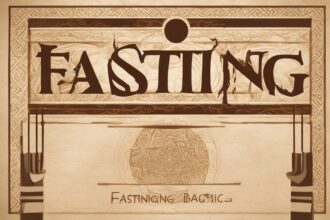Fasting, or the deliberate act of abstaining from food and sometimes drink for a specific period, is a practice that stretches back to the dawn of human civilization. The concept of dietary abstinence is not a modern invention but rather a tradition deeply rooted in cultural, spiritual, and health-related contexts. Exploring the ancient origins of dietary abstinence reveals how early humans integrated fasting into their lives, shaping religious practices, medical traditions, and societal norms across the globe. This post delves into the historical foundations of fasting, uncovering its significance in ancient societies and its evolution over time.
The Roots of Fasting in Prehistoric Societies
While written records from prehistoric times are nonexistent, anthropologists suggest that the ancient origins of dietary abstinence may have begun out of necessity rather than choice. Early humans likely experienced periods of food scarcity due to seasonal changes, migration, or unsuccessful hunts. These involuntary fasts could have been interpreted as acts of endurance or even spiritual cleansing by early communities. Cave paintings and archaeological findings, such as those in regions like the Sahara Desert, depict scenes of hunting and scarcity, hinting at periods of enforced abstinence that may have laid the groundwork for ritualistic fasting.
Some researchers propose that early humans might have observed the natural fasting behaviors of animals during hibernation or migration, inspiring them to adopt similar practices for survival or symbolic purposes. Though speculative, this theory highlights how deeply intertwined fasting may have been with human survival instincts long before organized societies emerged.
Fasting in Ancient Mesopotamia and Egypt
The cradle of civilization, Mesopotamia, provides some of the earliest documented evidence of fasting as a deliberate act. In ancient Sumerian and Babylonian cultures, fasting was often tied to religious observances and rituals of purification. Priests and priestesses would abstain from food before performing sacred ceremonies to appease the gods or seek divine guidance. The ancient origins of dietary abstinence in this region are evident in cuneiform tablets that describe fasting as a means of spiritual preparation during festivals like the Akitu, a New Year celebration involving penance and renewal.
Similarly, in ancient Egypt, fasting was linked to religious devotion and preparation for mummification rituals. Egyptians believed that abstaining from food purified the body and soul, aligning individuals with the divine. Fasting was also practiced by pharaohs and high priests during significant events, such as the flooding of the Nile, to ensure divine favor. These early practices demonstrate how fasting transcended mere survival and became a cornerstone of spiritual life in some of the world’s oldest civilizations.
Ancient Greece and the Philosophical Perspective on Fasting
In ancient Greece, fasting took on both spiritual and practical dimensions. The ancient origins of dietary abstinence here are closely associated with the Eleusinian Mysteries, secret religious rites dedicated to the goddess Demeter. Participants often fasted as a form of purification before initiation, believing it would bring them closer to the divine. Beyond religion, Greek philosophers like Pythagoras and Plato advocated for fasting as a means of mental clarity and physical health. Pythagoras, for instance, required his followers to abstain from certain foods and engage in fasting to discipline the body and elevate the mind.
Hippocrates, often regarded as the father of modern medicine, also promoted fasting as a therapeutic tool, famously stating, “Instead of using medicine, rather, fast a day.” This practical application of fasting in ancient Greece underscores its dual role as both a spiritual and medical practice, a perspective that continues to influence modern fasting trends. For more on the health benefits of fasting, check out our post on Fasting for Wellness: Historical and Modern Benefits.
Fasting in Ancient India and the Rise of Spiritual Traditions
India’s ancient history offers profound insights into the ancient origins of dietary abstinence, particularly within the contexts of Hinduism, Buddhism, and Jainism. In Hinduism, fasting (known as “Upavasa”) is a common practice during religious festivals like Navratri, where devotees abstain from specific foods or all food to honor deities and seek spiritual growth. Ancient texts like the Vedas and Upanishads mention fasting as a way to purify the body and mind, emphasizing self-discipline and detachment from material desires.
In Buddhism, fasting became a key practice for monks and laypeople alike, often tied to the concept of renunciation. The Buddha himself is said to have practiced extreme fasting before achieving enlightenment, though he later advocated for a “middle way” that balanced abstinence with nourishment. Jainism, another ancient Indian tradition, places an even stronger emphasis on fasting, with some practitioners engaging in prolonged periods of dietary abstinence as a form of non-violence (Ahimsa) toward all living beings. These traditions highlight how fasting in ancient India was not just a physical act but a deeply spiritual endeavor. Learn more about spiritual fasting in our article on Spiritual Fasting Across Cultures.
Fasting in Ancient Judaism and Early Christianity
The ancient origins of dietary abstinence are also evident in the religious practices of ancient Judaism, where fasting is a central component of atonement and mourning. The Hebrew Bible describes fasting during significant events, such as the Day of Atonement (Yom Kippur), which remains one of the holiest days in the Jewish calendar. Fasting on this day symbolizes repentance and spiritual renewal, a practice that dates back thousands of years to the time of Moses.
Early Christianity inherited many of these traditions, with fasting becoming a vital part of spiritual discipline. Jesus Christ is said to have fasted for 40 days in the wilderness, an event that inspired the Christian observance of Lent, a 40-day period of fasting and reflection leading up to Easter. Early Christian texts also mention fasting as a way to prepare for baptism or to seek divine intervention. These practices illustrate how fasting evolved from ancient Jewish traditions into a cornerstone of Christian faith. For a deeper dive into religious fasting, read our piece on The History of Religious Fasting.
The Universal Appeal of Fasting Across Ancient Cultures
What becomes clear when examining the ancient origins of dietary abstinence is its universal presence across diverse cultures and time periods. From the indigenous peoples of North America, who fasted during vision quests, to ancient Chinese practices of fasting for health and longevity as described in Taoist texts, the act of abstaining from food has served myriad purposes. Whether driven by spiritual, medical, or social motivations, fasting has been a unifying thread in human history, reflecting a shared understanding of the body’s connection to the mind and spirit.
This enduring practice continues to resonate today, as modern fasting methods like intermittent fasting draw inspiration from these ancient traditions. To explore how ancient fasting techniques inform contemporary practices, see our guide on Intermittent Fasting: From Ancient Roots to Modern Trends. Additionally, for a broader historical context, check out our overview at Fasting Through the Ages.
Disclaimer: The information provided in this article is for educational and informational purposes only and should not be construed as medical advice. Fasting, especially for extended periods, may not be suitable for everyone and can pose health risks if not done properly. Always consult with a healthcare professional or nutritionist before beginning any fasting regimen to ensure it aligns with your individual health needs and conditions.
References
- Encyclopaedia Britannica: Fasting – An overview of fasting across cultures and historical periods.
- History.com: Ancient Egypt – Information on religious practices, including fasting, in ancient Egyptian society.
- National Center for Biotechnology Information: Fasting in Ancient Medicine – A scholarly article on the therapeutic use of fasting in ancient Greece and beyond.
- The Metropolitan Museum of Art: Ancient Egypt and Mesopotamia – Insights into cultural practices, including fasting rituals.
- BBC: Fasting in Hinduism – A detailed look at fasting practices in Hindu traditions.
- Jewish Virtual Library: Fasting and Fast Days – Historical context for fasting in ancient Judaism.
This content is for informational purposes only and not a substitute for professional advice.






